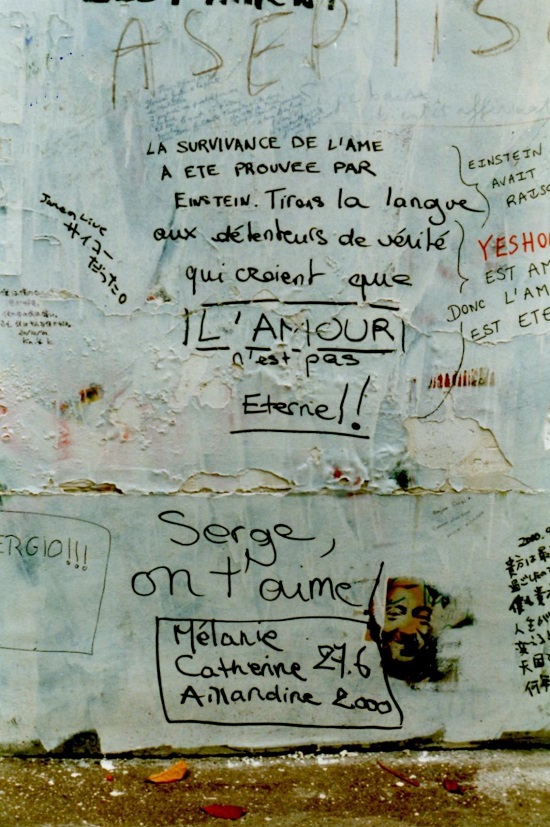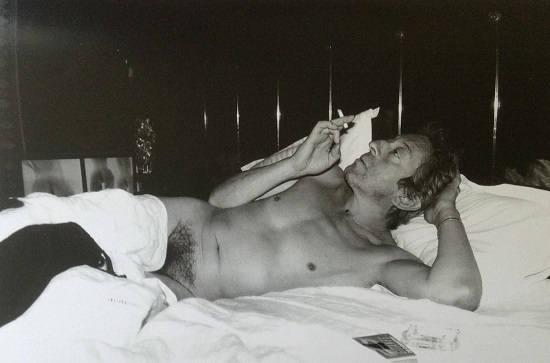When, in 1991, Serge secured a place in the renowned French encyclopaedia Larousse, slotted betweeen the painter Thomas Gainsborough and Nietzsche’s poetic opus ‘Gai Savoir’, the song the compilers selected as representative of his oeuvre was ‘Je T’Aime… Moi Non Plus’, his duet with Jane Birkin. A song whose release as a single in 1969 caused outrage in several languages, at least one excommunication, incalculable unplanned pregnancies and sales in excess of six million singles worldwide.
While its vaporous, quasi-classical melody had its roots in an instrumental that Serge had written for the 1967 film Les Coeurs Verts, its title, he claimed, had been inspired by something that Salvador Dali once said: “Picasso is Spanish – me too. Picasso is a genius – me too. Picasso is a communist – me neither (moi non plus).” Although there are Gainsbourgologists who claim that this was a later press invention on Serge’s part – and its neat way of bringing the conversation around to his own artiness, anti-communism and genius would certainly have been the kind of shrewd device he favoured – he did have a lifelong habit of coming across a catchphrase or a slogan and twisting it into a title which would serve as the inspiration for a song. And it might be worth remembering that Serge never hid his admiration and affection for Dali, from buying his paintings and borrowing his home decor ideas to accompanying him on porn-watching sessions.
Certainly its languid, almost over-pretty, chocolate-box melody contained some odd words for a love song. But then, as the title indicated, this was a love song that denied it was a love song; or was too cynical or insecure to own up to what it really was. Something that Serge said in his ‘Mort Ou Vices’ interview comes to mind: All the key women in his life, he said, had told him that they loved him, “But me? Never. I feel it, but I don’t know how to say it – although I love to hear it said.”
“I was shocked,” Dominique Blanc-Francard (who years later would go on to become Serge’s engineer) recalled the first time he heard the song on the radio as a teenager in France. “But at the same time I was excited. It was great – and it was amazing that someone had dared to do that. No-one else I know of in France had ever gone that far on a record, and certainly not with the talent that the record showed. I think that was what was so special about it – to have managed to be so provocative and at the same time to make such a beautiful piece of music. There are a lot of Anglo-Saxon artists who have been just provocative – Bowie, Lou Reed – but never in France, and never with such a beautiful, and such a chaste melody.”
The press, of course, speculated that Serge and Jane had recorded a live sex session on a tape-recorder hidden under the bed. “To which Serge, said, ‘Thank goodness it wasn’t, otherwise I hope it would have been a long-playing record’. We made it,” said Jane, “very boringly in the studio in Marble Arch, both of us in sort of telephone cabins. When you recorded in the old days you only had two takes anyway. He also put his hand up – because he was very afraid I was going to go on with the heavy breathing two seconds longer than I should and miss the high note – which was very, very high, an octave higher than the Bardot recording, because Serge thought that was more perverse, like a little choirboy – so he was waving at me like a madman from his cabin.”
All in all it was a better version, Serge said, than his original recording with Bardot. That one was "sublime", he said, but at the same time “it was too… hot, whereas with Jane and me it was total technique. It’s like fucking: if you fuck hot, you fuck badly, if you fuck technique, you fuck better.” With Bardot he said “It was a horrifying kind of copulation, which was, I believe, too much.”

Posthumous graffiti from the wall of Gainsbourg’s house, by Sylvie Simmons
As soon as they had finished recording the song, Serge and Jane rushed back with it to Paris. “The hotel where we were living at the time – where Oscar Wilde died; Serge liked it because of that anecdote – had a restaurant in the wine-cellar where people could sit in the little compartments and have dinner. There was a man that used to play rather slow and discreet records for background music. Serge couldn’t resist popping on ‘Je T’Aime… Moi Non Plus’,” said Jane. As they sat back and watched, “Everybody’s knives and forks were in the air, suspended. Nobody went on eating. Serge said ‘I think we’ve got a hit’.”
So did the record company chief. “He already knew the song because he’d heard the Bardot version, but he listened to it and said, ‘Well Serge, I’m willing to go to prison but I’d rather go for a long-playing record, so go back to London and make another 10 songs, and I’ll bring it out under a plain cover’. So we went back to England – Serge made up a couple of new songs on the ferry boat and we resang a few others so we could put out an L.P. And they put Je T’Aime, Moi Non Plus out in a plastic cover on which they wrote ‘Interdit aux moins de 21 ans’.” Over 21s only. Which of course guaranteed that sales soared.
In Italy, Je T’Aime, Moi Non Plus was banned after being denounced as an “obscenity” in the Vatican newspaper, L’Osservatore Romano. “The head of Phonogram in Italy was sent to prison and excommunicated,” said Jane – actually a two-month suspended sentence and a fine for the distributor. Bans followed in Spain and Sweden. In the U.S., with very limited airplay, it hit an implausibly perfect soixante-neuf in the singles charts.
In the UK, soon after its summer 1969 release, the BBC announced that the song was “not considered suitable for play”. In August the song made it to number two in the charts – and would have gone to the top if Philips’ U.K. arm, Fontana, had not bowed to pressure from its international H.Q. They too issued a statement, which announced: “Certain sections of the press and general public have seen fit to make a controversy over the contents of this recording. And as Philips does not intend to allow any of their products to be the subject of controversial matters, the record is being withdrawn from our catalogue.”
At which point British keyboard player Tim Mycroft, operating under the group name Sounds Nice, took the opportunity to step in with an instrumental version, renamed ‘Love At First Sight’. His rendition charted too, reaching number 18 in September. Then suddenly Serge and Jane’s version was back in the shops again – resuscitated by an independent record label, Major-Minor. In October 1969 it made it to number one: the first foreign-language single to […] take the pole position, [it] spent a total of 34 weeks on the U.K. chart.
Over the years it would continue to make the odd reappearance. Sometimes very odd. First, as expected, came the spoof version: Up Pompeii’s Frankie Howerd duetting with June Whitfield in 1971 on ‘Up Je T’Aime’. Upholding the fine reputation of British sexuality, it featured June trying to stir the snoring Frankie by whispering French words of love in his ear, only to be met with: “What on earth’s got into you? It’s not Friday, is it? Speak English, woman!” and so on. In 1975 Judge Dread’s cover made it into the top 10. Even into the ’80s, the song could still shift copies. A quite dreadful cover by actors Gordon Kaye and Vicki Michelle from the TV series ’Allo, ’Allo, singing in their characters of René and Yvette, managed to squeeze into the Top 60. The ’90s brought a bagpipe version by The Lothian & Borders Police Band. The song made its last, and possibly least appropriate British appearance of the millennium as the theme music to a British TV commercial – the not entirely erotic John Smith’s Bitter beer.
In the U.S. ‘Je T’Aime, Moi Non Plus’ was tugged into a sixteen minute epic in 1978 by disco queen Donna Summer, and sung by Cibo Matto and Sean Lennon on John Zorn’s Gainsbourg tribute album. In Australia it was translated into English by Mick Harvey of The Bad Seeds and sung by Nick Cave and Anita Lane. But it was the U.K. that truly embraced the song – for which Serge had a theory. He shared it with French magazine Rock & Folk in 1971: “I know certain people close to Princess Margaret who think it’s about sodomy. A fact which made them very happy. Perhaps that’s the reason why I got to number one in England.”
The source “close to Princess Margaret” one assumes, was Lord Snowdon. Snowdon also told Serge – to Serge’s utter delight – that on one of his trips with the wife to the Caribbean, the brass band dispatched to the airport to give the distinguished visitors their official greeting played the only two “British” tunes they knew – the U.K. National Anthem, and ‘Je T’Aime … Moi Non Plus’.
“Even now, when I go to England,” said Jane, “taxi drivers screech to a halt when I can’t resist saying I was the girl who sang ‘Je T’Aime… Moi Non Plus’. One of them turned round and said, ‘I had three fucking children to that record!’ He had it at home and I went there and signed it. It’s a historical record – but it’s also a criminal record; you’re reminded of it constantly. All I got from the British press for the last 30 years, was ‘what dirty records have you made, Jane?’ which was a bit demoralising. But actually, if you’re going to be well-known for something until you die, why not that?”
In a sober moment, Serge claimed that his hymn to sexual liberation was, in fact, an “anti-fuck” song, about the desperation and innate impossibility of physical love. If the Vatican had not approved of its “almost liturgical” melody, they could at least have commended him for lyrics in which he did not allow himself to come. Whatever, at the age of 41 and after 11 years in the business, Serge finally had his hit. An enormous hit. One that deserved a mark of recognition. Since nobody had awarded him one, he took himself off to Cartier the jewellers and ordered himself a star – a Jewish star, in platinum. A first step towards exorcising the rejection and humiliation of his teenage “sheriff’s badge” years.
From Serge Gainsbourg: A Fistful of Gitanes by Sylvie Simmons. Originally published in 2001, an expanded version is now available digitally for the first time


